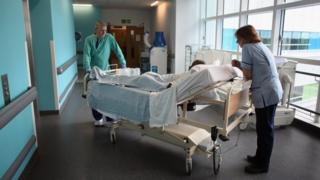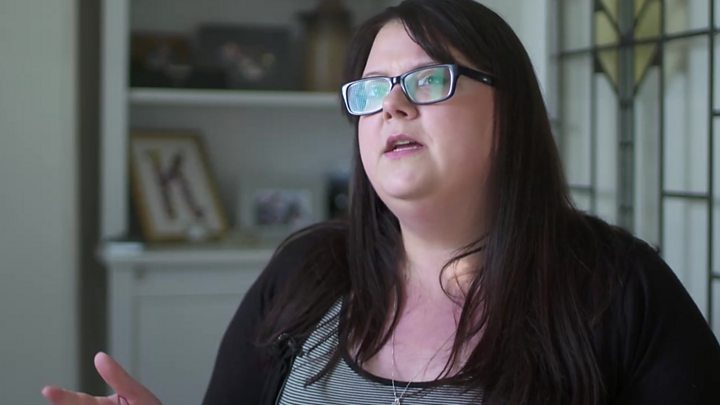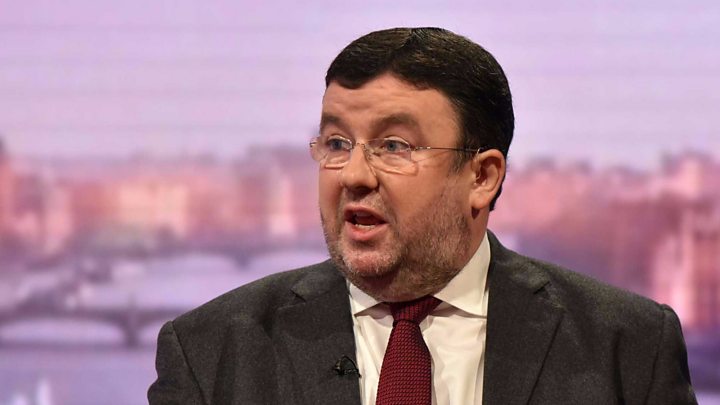 Image copyright
Image copyright
Getty Images
Patients are dying in hospital corridors as safety is compromised by “intolerable” conditions, doctors say.
The warning has been issued in a letter to the prime minister signed by 68 senior A&E doctors, spelling out the danger patients are facing this winter.
It comes as reports have emerged of people being left for hours on trolleys in corridors and stuck in ambulances.
Hospital bosses said they had run out of beds as they battle with “very high” rates of flu.
Official figures show the number of hospital admissions from flu has risen by more than 50% in the past week in England, although Public Health England officials said the levels were certainly not “unprecedented”.
Instead, hospital bosses have blamed the bed shortages on a lack of money and staff.
Last week, there was a point when 133 out of 137 hospital trusts in England had an unsafe number of patients on their wards, NHS records show.
Can’t find your health trust?
Browse the full list
Rather search by typing?
Back to search
Figures are assessed against targets before rounding
iframe {
height: 100vh;
}
/* Apply some default styling for core content */
.bbc-news-vj-iframe-wrapper html,
.bbc-news-vj-iframe-wrapper address,
.bbc-news-vj-iframe-wrapper blockquote,
.bbc-news-vj-iframe-wrapper body,
.bbc-news-vj-iframe-wrapper dd,
.bbc-news-vj-iframe-wrapper div,
.bbc-news-vj-iframe-wrapper dl,
.bbc-news-vj-iframe-wrapper dt,
.bbc-news-vj-iframe-wrapper fieldset,
.bbc-news-vj-iframe-wrapper form,
.bbc-news-vj-iframe-wrapper frame,
.bbc-news-vj-iframe-wrapper frameset,
.bbc-news-vj-iframe-wrapper h1,
.bbc-news-vj-iframe-wrapper h2,
.bbc-news-vj-iframe-wrapper h3,
.bbc-news-vj-iframe-wrapper h4,
.bbc-news-vj-iframe-wrapper h5,
.bbc-news-vj-iframe-wrapper h6,
.bbc-news-vj-iframe-wrapper noframes,
.bbc-news-vj-iframe-wrapper ol,
.bbc-news-vj-iframe-wrapper p,
.bbc-news-vj-iframe-wrapper ul,
.bbc-news-vj-iframe-wrapper center,
.bbc-news-vj-iframe-wrapper dir,
.bbc-news-vj-iframe-wrapper hr,
.bbc-news-vj-iframe-wrapper menu,
.bbc-news-vj-iframe-wrapper pre {
display: block;
}
.bbc-news-vj-iframe-wrapper li {
display: list-item;
padding: 0.2em;
}
.bbc-news-vj-iframe-wrapper head {
display: none;
}
.bbc-news-vj-iframe-wrapper table {
display: table;
}
.bbc-news-vj-iframe-wrapper tr {
display: table-row;
}
.bbc-news-vj-iframe-wrapper thead {
display: table-header-group;
}
.bbc-news-vj-iframe-wrapper tbody {
display: table-row-group;
}
.bbc-news-vj-iframe-wrapper tfoot {
display: table-footer-group;
}
.bbc-news-vj-iframe-wrapper col {
display: table-column;
}
.bbc-news-vj-iframe-wrapper colgroup {
display: table-column-group;
}
.bbc-news-vj-iframe-wrapper td,
.bbc-news-vj-iframe-wrapper th {
display: table-cell;
}
.bbc-news-vj-iframe-wrapper caption {
display: table-caption;
}
.bbc-news-vj-iframe-wrapper th {
font-weight: bolder;
text-align: center;
}
.bbc-news-vj-iframe-wrapper caption {
text-align: center;
}
.bbc-news-vj-iframe-wrapper h1 {
font-size: 2em;
margin: 0.67em 0;
}
.bbc-news-vj-iframe-wrapper h2 {
font-size: 1.5em;
margin: 0.75em 0;
}
.bbc-news-vj-iframe-wrapper h3 {
font-size: 1.4em;
margin: 0.83em 0;
margin-top: 2em;
}
.bbc-news-vj-iframe-wrapper h4,
.bbc-news-vj-iframe-wrapper p,
.bbc-news-vj-iframe-wrapper blockquote,
.bbc-news-vj-iframe-wrapper ul,
.bbc-news-vj-iframe-wrapper fieldset,
.bbc-news-vj-iframe-wrapper form,
.bbc-news-vj-iframe-wrapper ol,
.bbc-news-vj-iframe-wrapper dl,
.bbc-news-vj-iframe-wrapper dir,
.bbc-news-vj-iframe-wrapper menu {
margin: 1.12em 0;
}
.bbc-news-vj-iframe-wrapper h5 {
font-size: .83em;
margin: 1.5em 0;
}
.bbc-news-vj-iframe-wrapper h6 {
font-size: .75em;
margin: 1.67em 0;
}
.bbc-news-vj-iframe-wrapper h1,
.bbc-news-vj-iframe-wrapper h2,
.bbc-news-vj-iframe-wrapper h3,
.bbc-news-vj-iframe-wrapper h4,
.bbc-news-vj-iframe-wrapper h5,
.bbc-news-vj-iframe-wrapper h6,
.bbc-news-vj-iframe-wrapper b,
.bbc-news-vj-iframe-wrapper strong {
font-weight: bolder;
}
.bbc-news-vj-iframe-wrapper blockquote {
margin-left: 2.5em;
margin-right: 2.5em;
}
.bbc-news-vj-iframe-wrapper i,
.bbc-news-vj-iframe-wrapper cite,
.bbc-news-vj-iframe-wrapper em,
.bbc-news-vj-iframe-wrapper var,
.bbc-news-vj-iframe-wrapper address {
font-style: italic;
}
.bbc-news-vj-iframe-wrapper pre,
.bbc-news-vj-iframe-wrapper tt,
.bbc-news-vj-iframe-wrapper code,
.bbc-news-vj-iframe-wrapper kbd,
.bbc-news-vj-iframe-wrapper samp {
font-family: monospace;
}
.bbc-news-vj-iframe-wrapper pre {
white-space: pre;
}
.bbc-news-vj-iframe-wrapper button,
.bbc-news-vj-iframe-wrapper textarea,
.bbc-news-vj-iframe-wrapper input,
.bbc-news-vj-iframe-wrapper select {
display: inline-block;
}
.bbc-news-vj-iframe-wrapper big {
font-size: 1.17em;
}
.bbc-news-vj-iframe-wrapper small,
.bbc-news-vj-iframe-wrapper sub,
.bbc-news-vj-iframe-wrapper sup {
font-size: 0.83em;
}
.bbc-news-vj-iframe-wrapper sub {
vertical-align: sub;
}
.bbc-news-vj-iframe-wrapper sup {
vertical-align: super;
}
.bbc-news-vj-iframe-wrapper table {
border-spacing: 2px;
}
.bbc-news-vj-iframe-wrapper thead,
.bbc-news-vj-iframe-wrapper tbody,
.bbc-news-vj-iframe-wrapper tfoot {
vertical-align: middle;
}
.bbc-news-vj-iframe-wrapper td,
.bbc-news-vj-iframe-wrapper th,
.bbc-news-vj-iframe-wrapper tr {
vertical-align: inherit;
}
.bbc-news-vj-iframe-wrapper s,
.bbc-news-vj-iframe-wrapper strike,
.bbc-news-vj-iframe-wrapper del {
text-decoration: line-through;
}
.bbc-news-vj-iframe-wrapper hr {
border: 1px inset;
}
.bbc-news-vj-iframe-wrapper ol,
.bbc-news-vj-iframe-wrapper ul,
.bbc-news-vj-iframe-wrapper dir,
.bbc-news-vj-iframe-wrapper menu,
.bbc-news-vj-iframe-wrapper dd {
margin-left: 1.12em;
padding-left: 1.12em;
}
.bbc-news-vj-iframe-wrapper ol {
list-style-type: decimal;
}
.bbc-news-vj-iframe-wrapper ul {
list-style-type: disc;
}
.bbc-news-vj-iframe-wrapper ol ul,
.bbc-news-vj-iframe-wrapper ul ol,
.bbc-news-vj-iframe-wrapper ul ul,
.bbc-news-vj-iframe-wrapper ol ol {
margin-top: 0;
margin-bottom: 0;
}
.bbc-news-vj-iframe-wrapper u,
.bbc-news-vj-iframe-wrapper ins {
text-decoration: underline;
}
.bbc-news-vj-iframe-wrapper center {
text-align: center;
}
.bbc-news-vj-iframe-wrapper :link,
.bbc-news-vj-iframe-wrapper :visited {
text-decoration: underline;
}
.bbc-news-vj-iframe-wrapper :focus {
outline: thin dotted invert;
}
.bbc-news-vj-iframe-wrapper a {
font-size: 1em;
}
.bbc-news-vj-iframe-wrapper iframe {
-webkit-overflow-scrolling: touch; /* Allow scroll when using VoiceOver */
}
]]>
If you can’t see the NHS Tracker, click or tap here.
The letter from doctors in England and Wales sets out some of the impact of this pressure.
It says:
- Patients are having to sleep in makeshift wards set up in side rooms
- Trolley waits of up to 12 hours are being routinely seen as staff struggle to find free beds
- Thousands of patients are left stuck in the back of ambulances waiting for A&E staff to take them in
- More than 120 patients a day are being managed in corridors in some places, some dying prematurely
The letter has been sent on the day it has been revealed that England’s A&Es missed their four-hour waiting time target by a record margin in December – more than 300,000 patients waited longer than they should.
Just over 85% of patients were seen in four hours – well below the 95% target – and marginally worse than the previous low in January 2017.
Chris Hopson, of NHS Providers, said hospitals were unsafe and overcrowded, and the NHS was at a “watershed moment”, requiring long-term funding.
The rest of the UK is also struggling. Waits in Scotland’s major A&E units hit their worst levels at the end of December.
The Welsh government has said the health service was facing “significant pressure” and in Northern Ireland the Antrim Area Hospital has had to bring in St John Ambulance volunteers to help with a surge in demand.
‘There was no dignity – it was chaos’

Rosie Dawson, 37, is only one of the patients who has been caught up in the problems.
She was taken to Torbay General A&E on 3 January with a gynaecological problem which had left her with severe pain and bleeding.
She said it was chaos, with trolleys everywhere, staff running up and down corridors and queues of ambulances outside.
Staff could not find a private area for her in which to assess her, so she ended up being examined in front of other patients.
“There was no dignity. It was degrading,” she said. “I couldn’t fault the staff, there was nothing they could do. It was chaos.”
This is a ‘watershed moment’
Speaking to the BBC, Mr Hopson said last year was “the first time ever” in NHS history that all of its key targets for A&E, cancer and planned operations across the UK had been missed.
He said hospitals were short of 10,000 to 15,000 beds and it was time for the government to decide how to fund the NHS in the long term.
Since 2010 the budget has been rising at about 1% a year on average whereas traditionally the NHS received more than 4%.
“We have reached a watershed moment where either we fund the NHS to the extent that is needed to meet those standards or, and this is absolutely not what we want, we abandon those standards.
“But it is a watershed moment. We are now at the point where we cannot deliver the NHS constitutional standards without a long-term funding settlement.”
Mr Hopson said mild weather and low flu rates had helped hospitals “scrape by” during previous winters.
“Maybe if we had been lucky again this year we could, just about, have coped,” he added.
“But it has not turned out that way. Flu is rising, there is more respiratory illness and the cold weather is taking its toll.”

Figures from Public Health England show “medium” levels of flu are circulating across the community, but they are causing “very high” rates of admission to hospital.
On both measures, flu rates are the highest since 2011, the year after the pandemic when there was a lot of swine flu circulating.
Prime Minister Theresa May insisted the government was still doing enough to support the health service, but blamed flu for the pressures on hospitals.
A spokesman for the Department of Health and Social Care in England added: “We know there is a great deal of pressure in A&E departments. We are grateful to all NHS staff for their incredible work in challenging circumstances.”
But he added that plans were in place to help, including extra money for council-run care services so people could be moved out of hospital more quickly and the single biggest expansion in doctoring training places in the history of the NHS – 25% in the coming years.
Has your operation been cancelled? Have you had to wait a long time in A&E? Please share your experiences by emailing haveyoursay@bbc.co.uk.
Please include a contact number if you are willing to speak to a BBC journalist. You can also contact us in the following ways:
- WhatsApp: +447555 173285
- Tweet: @BBC_HaveYourSay
- Upload your pictures / video here
- Send an SMS or MMS to 61124 or +44 7624 800 100
Patients ‘dying in hospital corridors’

